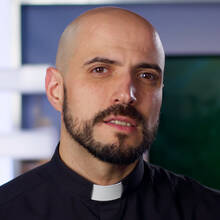A Reflection for Wednesday of the Fifth Week of Lent
Find today’s reading here.
“If you remain in my word, you will truly be my disciples, and you will know the truth, and the truth will set you free.” (Jn 8:31-32)
It is a maxim that often looms large in reputed halls of learning all over the world: “The truth will set you free.” Yet its inscription on the walls of such learned places, and the almost glib meaning it has taken on in our day-to-day use, betrays its original context and does more to discredit its intended purpose than to forge its fulfillment.
We are first confronted with these words in today’s Gospel passage when Jesus addresses those who lord their superior religious authority over God’s people: “If you remain in my word, you will truly be my disciples, and you will know the truth, and the truth will set you free.”
The “truth” Jesus speaks of is not contained in books or heard in lectures of even the wisest and most humble scholars and thought leaders. The truth that sets us free is Jesus himself; the truth that we come to know only in a personal relationship with the one who is both fully human and divine. It is far from the truth of cold facts that we prioritize today, or that we uphold when we make a solemn oath to clear our name or convict another: “I swear to tell the truth, the whole truth and nothing but the truth, so help me God.” Yet the truth that knowing Jesus will set us free is perhaps the only fact that is, indeed, worth testifying.
The truth “setting us free,” as employed in our modern parlance, is most often focused on the liberation of an individual.
Priests, therapists, police officers and lawyers speak these words, encouraging a person to “tell the truth,” to prick a person’s conscience and inspire moral responsibility. By appealing to that gnawing guilt that often accompanies wrongdoing and the failure to be truthful, they urge the person suspected of dishonesty to confess. The utterance of the truth, or even the quieter stirrings that mere thoughts of the truth have on our hearts, can be liberating. These six words, “The truth will set you free,” inspire us when we’re caught in a dilemma and faced with a difficult decision, urging us to be honest with ourselves and act according to what is true. Or we muster the moral courage, as it’s often said, to “Speak our truth.”
Gustavo Gutiérrez, a Dominican priest and one of the founders of the school of liberation theology, in one of his lesser-known works La verdad los hará libres. Confrontaciones (The Truth Shall Make You Free: Confrontations), presents an understanding of “Truth” the same as that espoused by fellow liberation theologians, Leonardo and Clodovis Boff. In a 1986 open letter addressed to Cardinal Ratzinger, the Boff brothers question elements of the “Instruction on Christian Freedom and Liberation” issued by the then-Congregation for the Doctrine of the Faith (now the Dicastery for the Doctrine of the Faith), which was published in the Folha de S. Paulo, a major Brazilian national newspaper:
“Truth” here is saving truth, the truth that changes us from unjust to just, from people of solitude to people of solidarity, from alienated from God to friends of God. The truth doesn’t free us simply because we become aware of it or proclaim it through every form of media. If we are to know the truth of God as understood by the Bible, we must be converted, do justice, and practice love. (“Convocatória General em prol da libertação” [General Call for Liberation] Folha de São Paulo, May 11, 1986).
I hope that their words may inspire a fundamental shift in us when thinking about truth today; that to find truth we need to shift from a personal patrimony to a shared solidarity in communion with all of God’s children—from “what makes me free” to “what sets us all free.”
Jesus did not die for himself but for us all. As we approach Holy Week, may these words draw us closer to Jesus who died for us all, and invites us to share bread.
Note: A previous version of this reflection stated that Gustavo Gutiérrez’s idea of Truth in La verdad los hará libres. Confrontaciones (The Truth Shall Make You Free: Confrontations) was contrary to that of the Boff brothers. This error has been corrected.








